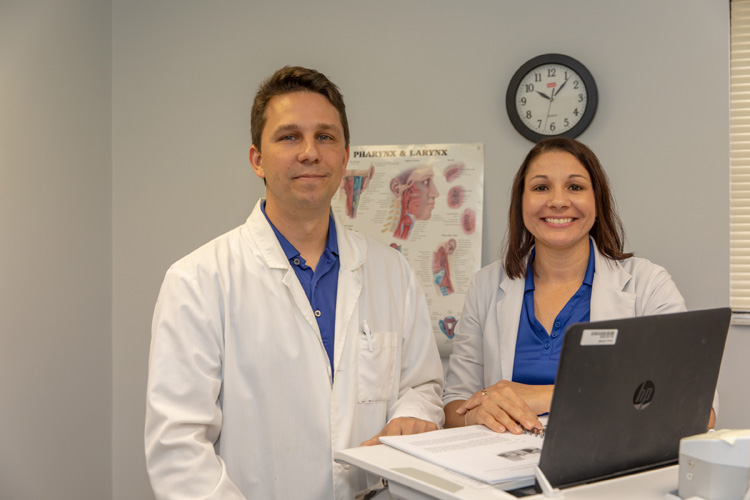PHOTO: Denise Richie — Speech pathologists, including Jessica Fitzgerald and Mike Gaughran at the Steward Medical Group’s Sebastian River Medical Center, may have one of the most incomplete job titles in all of medicine.
Like their counterparts across the country, Fitzgerald and Gaughran do much more than work with people who have speech problems.
They also help treat stroke, traumatic brain injury, Parkinson’s and Alzheimer’s patients.
Those four problems make up a huge universe of potential patients.
According to the American Heart Association, “stroke affects nearly 500,000 people a year and is the leading cause of disability in older adults. Another 1.7 million people sustain some form of traumatic brain injury.”
Add to that what the Alzheimer’s Association says is an “estimated 5.7 million Americans of all ages living with Alzheimer’s dementia” and the 60,000 people diagnosed with Parkinson’s disease in the U.S. each year, and it starts to become clear that speech pathologists are tasked with much more than helping clear up simple speech problems.
For example, the National Stroke Association points out, after a stroke it is very common for patients to have multiple communication problems. “This condition,” says the NSA, “is known as aphasia and can affect your ability to find the right words, to understand what others are saying and/or reading and writing.”
Gaughran estimates 50 percent of the patients he and Fitzgerald see in their Sebastian offices are stroke or Alzheimer’s patients – and the initial consultations don’t always go smoothly.
“When you go in and introduce yourself as a speech pathologist,” says Fitzgerald, “it’s not uncommon to hear a patient say, ‘there’s nothing wrong with my speech.’ But we don’t just treat speech.
“If someone has aphasia from a stroke, maybe they also have some cognitive impairment and that’s where I think we have to determine which problems are more speech- or language-based and which ones are more cognitive-based.”
Asked how – or if – it is possible to teach or re-teach cognition, Gaughran pauses briefly before saying, “that’s a good question. We’ve got a couple of things. If a patient comes in with memory problems, we might show them the stages of memory – I might explain there are three stages to memory. We take information in, we store it and then we retrieve it. And then we would give them some memory strategies,” to help them retrieve that information.
Fitzgerald quickly adds, “the root of our profession is function,” and to that end, role-playing and specific situational strategies can be a big help for patients.
For instance, “when a patient is cooking at the stove and the doorbell rings, my strategy would be to complete one task at a time: Move that pot off of the stove, turn the stove off and then go answer the door. Don’t just leave [the stove] going because then by the time you [finish dealing with whatever distracted you], you’ll come back and have burned the house down.”
While that might sound extreme, cooking fires are an all-too-common occurrence for patients with dementia or aphasia.
And while both Gaughran and Fitzgerald are keenly aware that everyone wants a “magic pill” that will instantly cure their speech or cognitive problems, the hard fact is no such pill exists, so preserving and building on what speech and cognitive abilities patients still have becomes the top priority.
“In Parkinson’s, Alzheimer’s and some of those degenerative kind of problems, it’s not so much about restoring [what’s been lost],” says Gaughran. “It’s more about maintaining what they still have – we’re trying to preserve some of that remaining function. If we can maintain what they do have, well, that’s a win for the patient.”
Speech pathology is not a field for the under-educated or the faint of heart. The job requires both a bachelor’s and master’s degree along with a nine-month clinical fellowship and 30 hours of continuing education every two years. And a lot of drive.
“There really are lots of folks out there that have difficulty with organization, planning, some of those higher-function skills, short-term memory and word-finding,” Gaughran concludes. He and Fitzgerald are confident they can help.
Mike Gaughran and Jessica Fitzgerald are with the rehab services at the Sebastian River Medical Center in Sebastian. The phone number is 772-581-2068. n

